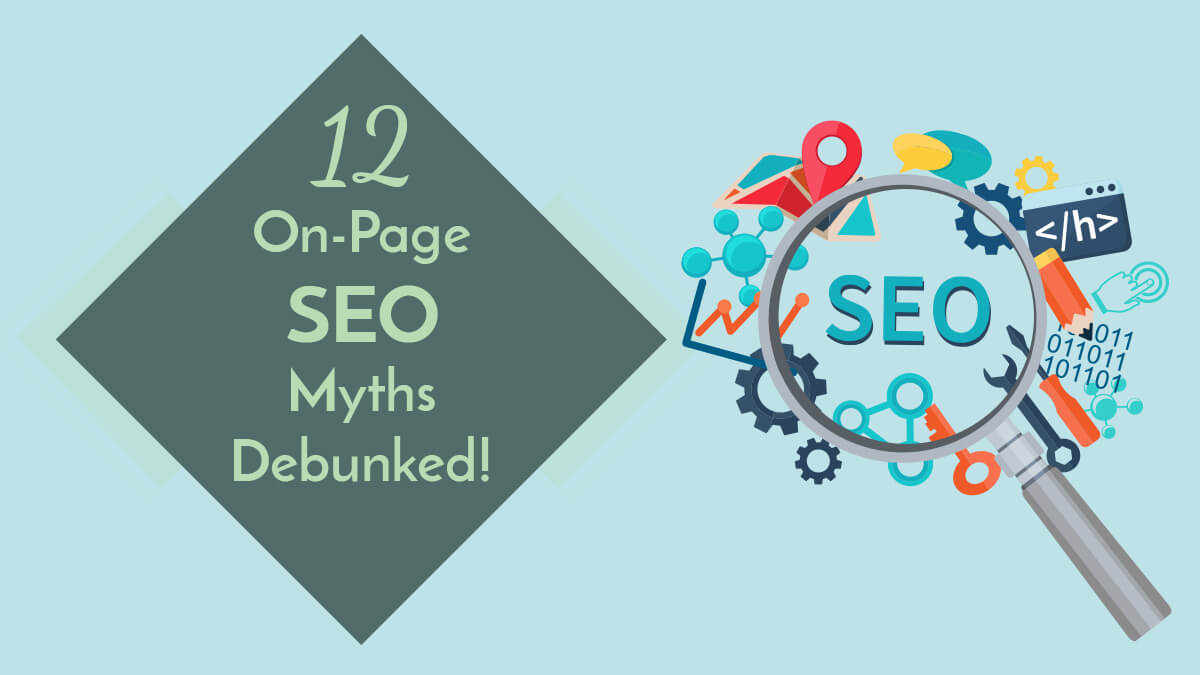You are sure to get a cramp up as you cannot eat before going swimming. You can improve your vision by eating carrots. Lightning strikes one place at a time. Do these statements have anything in common? These are all myths here.

If you eat before swimming, there is no evidence that you will get muscle cramps, or you can get away from glasses by eating carrots. At an average of 25 times a year, the Empire State Building gets struck by lightning so that lightning can hit a single place more than once.
Is there any other topic that carries its myths?
Yes! Search Engine Optimization. SEO!
How the algorithm ranks sites in search results, many SEO myths come from Google’s secrecy.
Today, we are going to debunk many such SEO myths that one can come across. Please scroll down to learn about 12 common SEO myths to get the real facts about each of them.
SEO Myth #1: You Need not Have to Perform Keyword Research
You need not have to conduct keyword research is one of the first misconceptions of SEO.
If you think of a relevant keyword for your page, you need not have to research it or find additional supplemental keywords is what many people are going to say.
To use in your content, just thinking of a keyword is not that enough. You will not have the numbers to back up the fact that it is the right keyword to target if you do not have any keyword data.
Your page may only rank for one keyword limiting its visibility additionally without keyword research.
To ensure that you have chosen relevant keywords that will drive traffic to your page, you need to conduct keyword research.
SEO Myth #2: You Can Rank Your Page Better With the Use of More Keywords
The ranking will improve significantly as it is one of the most common SEO myths when you are integrating more keywords on your pages.
You need to use the keyword as often as possible throughout the content so that Google understands your page is relevant to the query that a user searched as many people still believe that if you want to rank.
Integrating your keywords too often will lead to keyword stuffing, which is a negative ranking factor is what the reality is.
Since Google views this strategy as a black hat SEO technique, Google can penalize your site for overuse keywords. Using any of the black hat techniques will hurt your site’s ranking as these tactics go against the guidelines of Google.
SEO Myth #3: Always Target the Right Keywords as Content Doesn’t Matter
It is all about keyword targeting, and this is one of the most common misconceptions about SEO.
If you target the keywords you want to rank form by merely sprinkling them through low-quality writing, the page’s content does not matter as much as what many people believe in. You will type in the search results since you are optimizing for that keyword. In other words, is what it means, right?
No, it is wrong!
To help you rank in the search results, your pages’ content plays the most critical role. You will not rank and search results no matter how well you are optimizing for search engines if you are not delivering high-quality content.
Since you will not provide the most compelling content on your page, you will not engage the leads successfully. They will also leave your page and increase your bounce rate if your audience does not find the information they need. It can also hurt your SEO ranking, as this action sends a negative signal to Google.
SEO Myth #4: SEO Ranking is Improved Through Sitemaps
In regards to the sitemap as this is the next myth on our list here. If you have a sitemap, it will instantly improve your SEO ranking, assisting you in getting to the top of the search results, which many people believe in.
The sitemap does not guarantee that you will be ranking higher in the search results in reality. On the improvement of your ranking, they do not have any direct impact.
It would help if you created one to help Google find and index your pages as sitemaps are still essential for your website. To crawl pages on your site, a sitemap provides a complete guide for Google.
The sitemaps will help Google crawl, and index pages appear in the search results though it cannot improve its rankings.
SEO Myth #5: You Don’t Need to Focus on Your Title Tag or Meta Description
The two bits of information that your audience sees first in the search results are your title tag and meta description. You do not need to optimize them because it is one of the most common SEO myths surrounding these two tags.
You will not be ranking as highly in the search results or drive as much traffic to your page if you neglect to optimize these two elements. To determine your page’s relevancy to their query, search engines and users use these two elements.
Your audience and search engines may not know if your page is relevant to the search results or not without optimizing these two elements.
SEO Myth #6: You Don’t Have to Create Content Constantly
The most critical and vital component of SEO is the creation of content.
You need not create them often is one of the most common SEO myths that revolve around content creation. It is enough to help you rank or keep your ranking as you may have heard that you can occasionally post a blog.
It is mainly an SEO myth here.
You need to create content often if you want to make the most of your SEO. You can create new ways for leads to discover your website as this means more traffic for your business when you are creating and posting content habitually. More content means that you can target more keywords along with the rest.
More content means more avenues for leading to stumbling across your company, which is why 60% of the marketers tend to create at least one piece of new content daily.
SEO Myth #7: You Should Rely on SEO Companies to Get Good Results
It has to do with the SEO companies, as this is the next point in our list of SEO misconceptions.
You may have noticed that some companies offer a guarantee getting you the first position or offer to get you to the top fast if you have ever investigated the SEO services.
It is the most dangerous SEO myths of all that are there.
A company that guarantees that they can get your company to rank in the 1st position fast is what you should not put your trust in. they are more than likely to use a black hat SEO technique that can go against Google’s guidelines if they promise these results.
SEO Myth #8: Backlinks are Excellent No Matter Where They Come From
You learn that the backlinks are a huge part of SEO when you are learning about them. People are directed back to your pages with the help of the backlinks, which are the links from other sites. To help you improve the ranking of your site, these links are quite important.
All the links that you get to your site are excellent no matter who is linking to you, as this is one of the most common SEO misconceptions that they have regarding the backlinks. Not all backlinks are great for your SEO.
The links that are from the untrustworthy sites are the bad backlinks. Having a link or multiple links to them can make your site seem less credible as these sites do not have any credibility.
It can make your site seem untrustworthy and also damage your ranking. You may also lead Google to believe that you are buying the links of a black hat SEO technique leading your website to get penalized if you have multiple spammy links.
SEO Myth #9: Focus Should be on Earning Backlinks
The backlinks are not the only links that matter for your SEO, as they are essential to help your SEO.
It would help if you only focused on earning the backlinks is one of the most common SEO myths that need to be debunked. While you are focusing on backlinks, you should also focus on the internal links realistically.
The links to other pages on your site are internal links. To keep your leads engaged on your site and when the leaders spend more time on your site, it can send a positive signal to Google that your site is relevant to the search results when you focus on the backlinks.
SEO Myth #10: SEO Should be Done Once
It is a once and done strategy, and this is one of the most common SEO myths that need debunking.
Few people believe that it is all that it takes to simply optimizing your site once for SEO. One of the biggest misconceptions about SEO that can damage your business is this perception.
You will not see the long-term results from it if you are performing SEO once. As time goes on, you will not be maintaining the ranks driving valuable traffic because you may see some initial optimization results.
You would love to do it continuously to get the most out of SEO. It may take a few weeks or even a month to show the results, but it will drive better results over time when you keep optimizing your campaign.
SEO Myth #11: Your SEO is Failing if You Don’t Get the First Position
They expect that people will get the first position for every keyword that they are targeting with the implementation of the SEO campaign.
Your webpage may not make it into that top position all the time while it is an SEO goal to earn the top posts.
If you are not ranking in this first position, your SEO is failing is one of the most common misconceptions about SEO. Many companies will be canceling their SEO campaigns or question if it is valuable to their business as a result.
Since you are not ranking at the top of the search results, it is quite essential to know, and it does not mean that your SEO is not working. Your campaign may need more time to develop products, or you have to refine your campaign.
Your competition may have more relevant content for a keyword, so that you may have to reoptimize your content to offer more relevant information in some of the cases here.
SEO Myth #12: Ranking is not Impacted by Your Mobile Site
Your mobile site does not impact your ranking; this is the other common misconception about SEO. You need not have to worry about your mobile site as many companies believe that if your desktop is a great shape.
It could not be anything further from the truth when you consider Google rolling out mobile-first indexing in 2018.
While ranking your pages, Google takes the mobile version of your site into account. You will not be ranking well in the search results if you do not have a mobile-friendly site. If you wish to have a chance at ranking top of the search results, your site must provide an excellent experience for all its users regardless of the device.
You need to have a mobile-friendly site to ensure that they have a positive shopping experience since 76% of consumers shop on the smartphone.
With the responsive design’s implementation into your web design, you can make your site mobile friendly.
